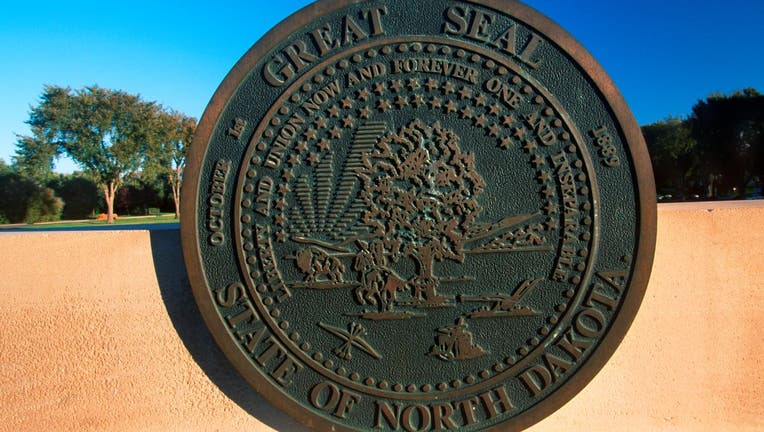New North Dakota laws that take effect Aug. 1

State Capitol of North Dakota, Bismarck (Photo by: Joe Sohm/Visions of America/Universal Images Group via Getty Images) (Getty Images)
BISMARK, N.D. (FOX 9) - Hundreds of new laws will take effect Tuesday in North Dakota, including greater enforcement of seat belt use and restrictions regarding gender identity, sexual content in public libraries and ownership of farmland by foreign entities.
North Dakota’s Republican-controlled Legislature adjourned April 30 after writing new laws and budgets for the next two years. Some contentious policy bills have already taken effect due to emergency clauses, which make legislation immediately into law when signed by the governor.
Among those already in effect are revised laws outlawing all abortions, except in cases where women could face death or a "serious health risk." Another exception for pregnancies caused by rape and incest applies only in the first six weeks, before many women know they are pregnant.
Here is what to know about the new laws taking effect in North Dakota.
Seat belts
North Dakota joins a majority of states with some form of a primary enforcement seat belt law, according to information from the Governors Highway Safety Association.
The state previously had secondary enforcement, meaning officers could cite front seat occupants for not wearing a seat belt only after a previous traffic infraction, though there was primary enforcement for minors in all seats.
The new law will require all vehicle occupants to wear seat belts, not just those in front seats. The fine remains at $20.
The proposed change was a hot debate for years in the Legislature, involving arguments of safety versus personal freedom. The change initially will be one of education before transitioning to enforcement, said Burleigh County Sheriff Kelly Leben, who supported the legislation.
"One of the arguments is people always say we should have personal choice, but we regulate a lot of things in our society, and that’s just part of living in a modern society, is there’s going to be rules, and seat belts are proven, time and time again, that’s the one thing people can do that will make a difference in a crash," Leben said.
The state government’s Vision Zero initiative aims to mitigate traffic deaths, with seat belts as one component.
North Dakota logged a 20-year low of 98 traffic deaths in 2022, according to preliminary data from the state Department of Transportation. Nearly 82% of front-seat vehicle occupants used seat belts in 2021, according to NDDOT data.
Gender identity
The Legislature passed a raft of gender-related bills that will soon take effect.
Those include two bills restricting transgender girls and women from participating on school sports teams matching their gender identity.
Other new laws will restrict sex amendments on birth records and bar transgender people from using restrooms and showers aligning with their identity in correctional facilities and public college dormitories.
Another bill that took effect in May prohibits transgender K-12 students from using restrooms aligning with their gender identity, among other restrictions. The Fargo School Board indicated it will defy the law.
One other bill, which took effect in April, criminalizes sex reassignment surgeries and gender-affirming care for minors.
Book banning
Republican lawmakers targeted sexual content in public libraries with a new law for removing or relocating "explicit sexual material" from public libraries’ children’s collections.
Republican Gov. Doug Burgum, who vetoed a broader bill allowing misdemeanor charges against librarians, said the new law "standardizes the process for local public libraries to review material when requested by parents, library users or other members of the public — a process already in place and working at nearly all public libraries across the state."
Fargo Public Library Director Tim Dirks consulted the city attorney regarding the library’s current policies for compliance with the new law, with which he said he feels comfortable. The law requires a "compliance report" from public libraries to a top legislative panel.
"I think the key thing for us is the existing policies and procedures that we have in place," but it remains to be seen how people will respond, Dirks said. The library has about 300,000 items on its shelves at three branches, plus vast collections of electronic materials.
It’s unclear how many challenges might arise to library materials, Dirks said. Fargo’s public library has had one or two challenges per year.
Republican lawmakers decried books such as "This Book Is Gay" by Juno Dawson and "Gender Queer" by Maia Kobabe.
"What I always found incredible to this whole conversation ... is that in a society with the First Amendment, free and open, you have to understand you are going to run into things that you find offensive," Dirks told The Associated Press. "Our job as the public library is to be representative as broadly as we can in terms of our society and our community."
Foreign owners of farmland
Two new laws will ban foreign governments and adversaries from owning land in North Dakota. The legislation came amid concerns of Chinese ties to a company’s proposed corn milling plant near the Grand Forks Air Force Base.
One law has exemptions for Canada and for agricultural research on no more than 160 acres (64.75 hectares).
The other law also bans local government boards from advancing foreign adversaries’ development plans during a two-year legislative study into related issues.
The new laws respond to constituents’ concerns but could create confusion for agribusiness companies with ties to foreign countries, Republican state Agriculture Commissioner Doug Goehring told the AP.
"It’s not a government that owns them, but it is a foreign entity, and the reality is all the work that they have to do for research ... they have to do at ground zero," he said.
Goehring noted all land in the U.S. is agricultural land until designated otherwise and an area of 160 acres is not enough for extensive research.
Other states such as Hawaii, Iowa, Minnesota, Mississippi and Oklahoma also have laws banning foreign ownership of farmland.


